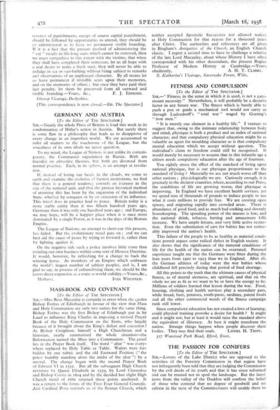GERMANY AND AUSTRIA [To the Editor of THE SPECTATOR.]
SIR,—Nearly the whole Press of Britain is loud this week in its condemnation of Hitler's action in Austria. But surely there is some flaw in a philosophy that leads us to disapprove of every change in an imperfect world. We are accustomed to refer all matters to the touchstone of the League, but the soundness of its own ideals we never question.
To my mind, the League of Nations is not unlike its content - porary, the Communist experiment in Russia. Both are founded on attractive theories, but both are divorced from normal practice. Each, in its sphere, is an attempt at revolu- tion.
If, instead of losing our heads in the clouds, we come to
earth and examine the evolution of human institutions, we find that there is a general tendency towards an increase in the size of the national unit, and that the proven historical method of attaining this has been by the expansion of the individual State, whether by conquest or by an extension of its influence. This trend does in practice lead to peace. Britain today is a more stable entity than it was fifteen hundred years ago, Germany than it was only one hundred years ago ; and Europe, we may hope, will be a happier place when it is once more dominated by a single Power, as it was in the days of the Roman Empire.
The League of Nations, an attempt to short-cut this process, has failed. But the evolutionary trend goes on ; and we can best aid the cause of peace by trying to forward it, rather than by fighting against it.
On the negative side such a policy involves little more than minding our own business within some sort of Monroe Doctrine. It would, however, be refreshing for a change to back the winning horse. As members of an Empire which embraces the world's largest number of subject peoples, and is, I am glad to say, in process of enfranchising them, we should be the last to decry expansion as a route to world stability.—Yours, &c.,














































 Previous page
Previous page